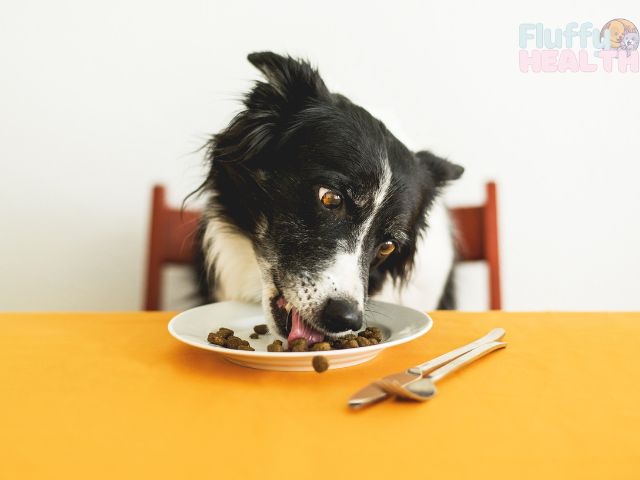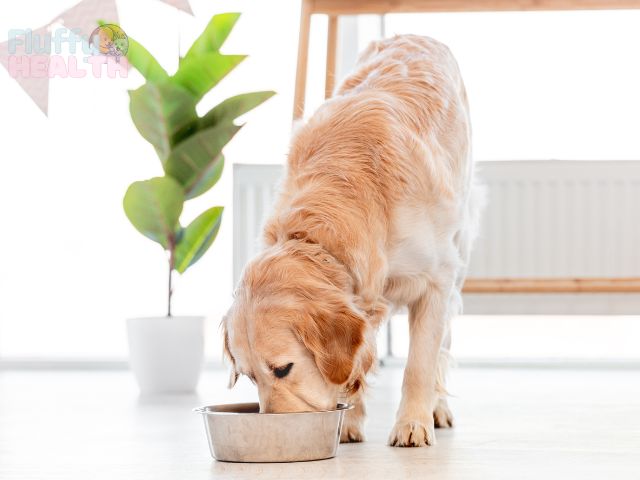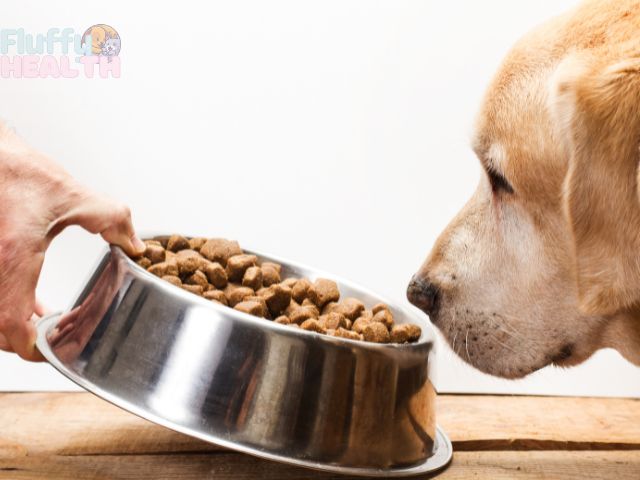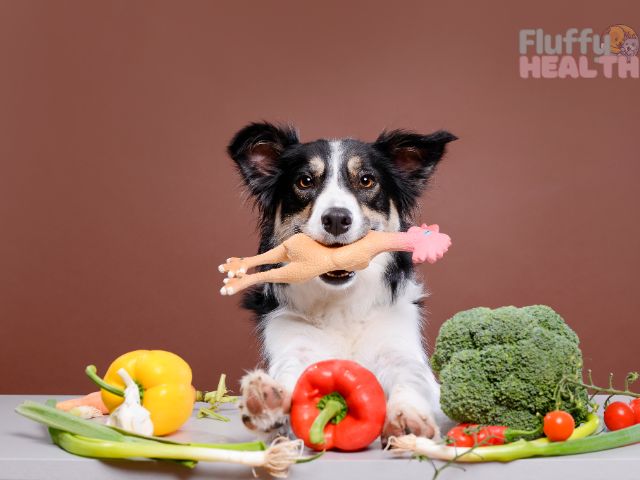How to improve my dog’s digestion? If your dog is having trouble with diarrhea, constipation, or gas then as a dog parent, you need to help them to keep their digestive system healthy. But with all the different opinions and products out there, it can be hard to know what’s best for your dog. In this article, we’ll share the key tips and strategies to help your dog’s digestion and keep their gut healthy.
Table of Contents
Understanding Your Dog’s Digestive Health
Knowing about your dog’s digestive health is important as a dog parent. Dogs have a unique mix of microbes in their guts that keep them healthy. If this mix gets out of balance, it can cause many health problems.
The Importance Of A Healthy Gut Microbiome
The dog’s gut microbiome is full of tiny living things like bacteria and fungi. These little helpers support your dog’s health in many ways. They help with digestion and keeping the body strong against sickness.
For a healthy gut, your dog needs a diet full of fiber and nutrients. Remember, adding probiotics to their food is a fantastic way of helping their digestive system, providing an extra layer of support for their overall gut health.
| Gut Microbiome Benefits | Supporting Factors |
|---|---|
| Aids in digestion and nutrient absorption | Balanced diet rich in fiber and protein |
| Produces essential vitamins and minerals | Variety of whole food ingredients |
| Defends against harmful pathogens | Probiotics and prebiotics |
| Regulates immune system function | Stress reduction and regular exercise |
Common Digestive Issues In Dogs
Dogs can sometimes get sick in their stomachs. They might have different symptoms, such as:
- Diarrhea
- Vomiting
- Constipation
- Gas and bloating
- Loss of appetite
If your dog has these problems often, you must see a vet because many things can cause them. They can find out why and help fix it. To help your dog’s stomach, you can also try digestive enzymes. They make it easier to digest food. Also, give them a good diet and plenty of water, and keep them calm away from stress.

The Role Of Diet In Digestive Health
Your dog’s diet is one important tip for keeping its digestive system healthy. The right mix of nutrients helps their gut stay healthy. Therefore, you need to start by looking for what your dog needs and what health problems it has to improve its diet.
High Protein, Low Fat Diet
Protein is important for dogs, especially from animal sources like chicken. It helps their body grow and stay strong. A low-fat diet is good for dogs with specific health issues. Talk to your vet about the right amount of protein and fat for your dog.
Grain-Free Options
While grain-free foods can be a great choice for dogs with grain sensitivities, it’s important to be aware that they may not always provide sufficient fiber. Fiber is an important element for maintaining a smooth digestive process.
If you pick grain-free, make sure your dog has enough dietary fiber. This keeps their digestive system healthy without any problems.
Choosing High-Quality Ingredients
Choose foods with natural, healthy ingredients, such as:
- High meat protein
- Animal fat
- Yucca
- Prebiotics
- Turmeric (Curcumin)
- Fenugreek
Turmeric helps with digestion. Prebiotics support good gut bacteria. If your dog has food allergies, find a bland diet or special food with your vet.
| Ingredient | Benefit |
|---|---|
| High meat protein | Provides essential amino acids for growth and maintenance |
| Animal fat | Source of energy and essential fatty acids |
| Yucca | Helps reduce stool odor and promotes nutrient absorption |
| Prebiotics | Supports the growth of beneficial gut bacteria |
| Turmeric (Curcumin) | Natural anti-inflammatory and digestive aid |
| Fenugreek | Aids in digestion and helps maintain healthy blood sugar levels |
Incorporating Raw Foods Into Your Dog’s Diet
Another amazing way to keep your dog’s gut healthy is by adding raw foods to their meals. Raw diets are good for dogs’ digestive health. They get important nutrients from raw meats, bones, fruits, and veggies.
However, when introducing raw foods to your dog’s diet, it’s important to proceed with caution. Start with small portions of raw meat and organs without bones, allowing their digestive system to adapt. Then, you can gradually introduce raw meaty bones for additional nutrients.
Choose different meats for your dog, such as chicken, turkey, and beef. These provide good protein and important fats and vitamins. Also, make sure their diet has 10% to 20% fat for energy.
You can also add fruits and veggies like broccoli and carrots to their meals. These are good for their gut and have antioxidants. They help with digestion and health.
| Raw Food Component | Recommended Percentage | Benefits for Digestive Health |
|---|---|---|
| Raw Meats (chicken, turkey, duck, pork, beef, rabbit, lamb) | 70-80% | High-quality, easily digestible protein; essential fats, vitamins, and minerals |
| Raw Meaty Bones | 10-15% (12-15% for puppies) | Calcium, phosphorus, magnesium; promotes dental health and jaw strength |
| Fruits and Vegetables (apples, brussel sprouts, green beans, etc.) | 10-20% | Prebiotic fiber; antioxidants; vitamins and minerals; aids in digestion |
A balanced raw diet can improve your dog’s digestion. It supports gut health and gives your dog the nutrients it needs. Always talk to your vet before changing your dog’s diet, and make sure to follow safe food handling practices.
Supplementing With Probiotics & Prebiotics
Dogs, like humans, can get better gut health from probiotics and prebiotics. Prebiotics feed the good bacteria in your dog’s gut. This helps keep the gut healthy and can make bowel movements better. Probiotics are like the good bacteria in the gut. They help keep the bad bacteria from taking over, which can cause digestive problems.
Benefits of Probiotics for Dogs
Probiotics are great for your dog’s health. They help keep the gut balanced. This can make your dog’s immune system stronger and help them digest food better.
- Strengthen the immune system to fight off pathogens and prevent infections
- Improve digestion and assist in the absorption of essential nutrients
- Reduce glucose levels, aiding in maintaining a healthy weight
- Enhance skin, coat, and overall immune health in the long term
Profivex® probiotic chews are a recommended solution. These chews, often used by vets after antibiotics or for digestion issues, are packed with beneficial bacteria and a high CFU count per treat.
Prebiotic-Rich Foods To Include
Prebiotics are special fibers that help good bacteria grow. Good sources for your dog include:
| Prebiotic Source | Examples |
|---|---|
| Fruits | Bananas, apples, berries |
| Vegetables | Sweet potatoes, pumpkin, carrots |
| Legumes | Chickpeas, lentils, green peas |
| Whole Grains | Oats, barley, brown rice |
Start with half a dose of probiotics for a week to avoid stomach problems. Give them every day. Don’t give probiotics right after antibiotics, as it might not work well. With probiotics and prebiotics, your dog’s gut health will improve, making it happier and healthier.
Exercise & Its Impact On Digestion
Regular exercise is key for your dog’s health, including their digestion. It keeps them fit and happy. It also helps with digestion and nutrient absorption.
How Physical Activity Promotes Digestive Health
Physical activity is vital for your dog’s digestive system. It helps their bowel movements and prevents constipation. This is especially important in summer when they’re more active.
Exercise is not just about keeping your dog fit, it’s about keeping them in control of their health. It helps maintain a healthy weight, which is an important factor in their digestion. Overweight dogs can have digestive issues like constipation and diarrhea, but with regular exercise, you can empower them to stay healthy.
Exercise also reduces stress in dogs, which is good for their digestion. Stress can cause digestive upset and even IBD. Giving your dog plenty of exercise and play helps reduce stress and supports their digestive health.
| Activity Level | Recommended Exercise Duration | Benefits for Digestive Health |
|---|---|---|
| Low | 20-30 minutes per day | Maintains regular bowel movements |
| Moderate | 30-60 minutes per day | Promotes healthy weight management and reduces stress |
| High | 60+ minutes per day | Enhances nutrient absorption and supports overall gut health |
Make sure your dog’s exercise fits their needs. Consider their age, breed, and health. Always talk to your vet about the right exercise for your dog. Adding probiotics, prebiotics, and fiber to your dog’s diet can also help. These, along with exercise can improve digestion and support a healthy gut.
By integrating exercise into your dog’s daily routine, you are not only supporting their digestive health but also enhancing their overall well-being. Whether it’s a leisurely walk or an energetic game of fetch, every bit of activity contributes to a healthier and happier dog.

Reducing Stress For Optimal Gut Health
Keeping your dog’s gut healthy is important for its happiness. Stress can make dogs eat weirdly and upset their stomachs, so creating a calm place for them is very important.
Using natural calm stuff like chamomile can help your dog feel better. It helps them relax and stay happy. This way, you can stop stress hormones that hurt their stomach.
Engaging in play and providing regular exercise for your dog is also a powerful stress-reducing strategy. Not only does it make them happy, but it also strengthens your bond and contributes to their overall well-being.
Find out what stresses your dog and try to avoid it. Things like loud noises or new people can upset them. A safe spot for them to hide can help them feel better.
| Stress Factor | Prevalence | Impact on Dog Gut Health |
|---|---|---|
| A common stressor for many dogs | 13% of dog reports globally | Increased levels of Lactobacillus sp., Bifidobacteria, and Enterobacteriaceae in anxious dogs compared to healthy counterparts |
| Car travel stress | Common stressor for many dogs | Can manifest in behaviors such as whining, barking, and vomiting, negatively impacting the human-animal bond and digestive health |
Even though stress might not immediately change their gut, long-term stress is bad. Improving your dog’s life and making it stress-free, you help their digestion and overall health.
Avoiding Common Digestive Disruptors
As a dog owner, you want your pet to stay healthy. However, some things we do can hurt their digestion. Avoiding these can help your dog feel better.
The Dangers Of Feeding Human Food
It’s hard to resist when your dog wants your food. But human food can be bad for them. Foods like chocolate and onions can make them very sick.
By sticking to dog food that’s made just for them, you’re making a responsible and caring choice for their health. If you want to give them a treat, choose something safe like cooked chicken or carrots.
Limiting Unnecessary Vaccines & Antibiotics
Vaccines are important for your dog’s health, but too many can hurt its digestion. Some vaccines last a long time, so dogs don’t need as many shots.
Too many antibiotics can also harm your dog. They kill good bacteria too. This can make your dog sick and upset their stomach.
Work with your vet to find the right vaccine schedule for your dog. Only use antibiotics when really needed. Probiotics and a good diet can help after antibiotics.
By avoiding these problems, you can improve your dog’s life. A healthy gut means a happy dog.
How To Improve My Dog’s Digestion? More Tips!
As a loving dog owner, you want your furry friend to be healthy. You can help their gut health with a few simple steps. Focus on keeping them hydrated and exposing them to new places.
Keep Your Dog Hydrated
Water is an important component of your dog’s health, aiding in digestion and preventing constipation. So, make sure your dog has access to water before and after meals to maintain its well-being.
Also, add wet food or low-sodium broths to their meals. This helps them drink more water, especially if they dislike drinking water directly.
Increase Environmental Exposure
Exposing your dog to new places is good for their gut. They can pick up good bacteria from the earth and air. Take them for walks in nature and open windows at home.
Playing with other dogs is also good for their health. Dogs share bacteria with each other. Even if they eat feces, they might get good bacteria from other dogs. This helps their gut and immune system.
| Digestive Issue | Percentage of Dogs Affected |
|---|---|
| Diarrhea/Loose Stools | 35% |
| Gas | 28% |
| Constipation | 22% |
| Bloating | 18% |
| Vomiting | 15% |
By keeping your dog hydrated and exposing them to new places, you help their digestion. These steps, along with a good diet and exercise, make your dog happy and healthy.

Conclusion
Keeping your dog’s gut healthy is very important. Their digestive system is special, with 2,532 proteins in their saliva. The migrating motor complex (MMC) helps keep their intestines clean.
It is important to feed them a balanced diet. Avoid high-fat or high-protein foods. Regular exercise and less stress also help a lot. Natural remedies can help too. Bone broth, yogurt, bananas, and apple cider vinegar are good for their gut. Digestive enzymes and finding food allergies can also help. Drinking enough water is also very important. It helps food move through their body well.
Always talk to your vet before changing your dog’s diet. They can help find the best food for your dog. Regular vet visits can catch digestive problems early. They can live a happy life by taking care of your dog’s gut health. Work with your vet to keep them healthy and happy.


Great article!
As a dog owner, I’ve experienced firsthand how diet and exercise can make a huge difference in a dog’s digestive health. I started incorporating prebiotics like pumpkin and probiotics into my dog’s meals, and it has significantly reduced his occasional bloating and gas issues.
I also found that adding a bit of wet food helps keep him hydrated, especially during hotter months. The emphasis on reducing stress and exercise is spot on—daily walks not only improve digestion but also keep my dog calm and happy. Thanks for these well-rounded tips—I’ll definitely be trying some of the raw food suggestions too!
Thank you so much for your feedback, Roopesh! It’s fantastic to hear that you’ve seen positive changes in your dog’s digestive health by incorporating prebiotics and probiotics into his diet. Pumpkin is indeed a wonderful addition for its fiber content and soothing properties, and I’m glad to hear it’s working well for your dog.
Adding wet food for hydration is a smart move, especially in the warmer months, as you mentioned. It’s great that you’ve noticed an improvement in his hydration and overall happiness from the combination of diet adjustments and consistent exercise.
I appreciate you sharing your experiences with reducing stress through daily walks, which align with the emphasis in our article on the holistic approach to digestive health. If you’re considering raw food options, starting slowly as you plan to do can be a great way to see how your dog responds without overwhelming his system.
Thank you again for your insightful comment and for trying out the suggestions. Keep us posted on how the raw food inclusion goes, and if you have any more tips or experiences to share, our community would love to hear them!
Thank you for your site. It is great to see a shift away from processed food for our beloved pets. They deserve the best too. Your article about raw foods, especially vegetables, really highlights the importance of including these in a pet’s diet and is on point. Keep doing the good work. You will change the lives of many families and their pets.
Your comprehensive guide on improving a dog’s digestion through various strategies is invaluable, particularly emphasizing the role of diet in digestive health. Incorporating raw foods as part of a balanced diet can indeed be transformative for a dog’s gut health, offering natural enzymes and nutrients that are often lost in processed foods.
This aligns well with the broader nutritional advice provided, such as choosing high-quality ingredients and considering grain-free options to avoid common allergens that can disrupt digestive processes.
Additionally, the integration of regular exercise and stress reduction strategies contributes significantly to overall digestive efficiency and health. This holistic approach not only supports the digestive system but also enhances the dog’s overall well-being through a stronger immune system and better nutrient absorption.
Thank you again and keep the great job you are doing for our beloved pets.
Thank you so much for your insightful comment and support! We’re thrilled to hear that the article on how to improve your dog’s digestion and the part about raw foods and digestive health resonated with you.
It’s truly our mission to shift the conversation towards providing natural, wholesome nutrition for our pets. They deserve the best, and it’s heartening to see more people recognizing the importance of quality ingredients and balanced diets, especially for our furry friends.
We’re glad that the emphasis on incorporating raw foods and understanding their impact on gut health is making a difference. As you noted, a balanced approach with raw foods, high-quality ingredients, and thoughtful dietary choices like grain-free options can indeed help minimize digestive issues while enhancing overall wellness.
Adding in exercise and stress reduction techniques creates a well-rounded, holistic approach to health. Seeing pet families embrace this is incredibly encouraging for us as we work to support the well-being of animals in every way we can.
Thank you again for your support and kind words. We look forward to continuing this journey together to make a difference for our beloved pets!
Fluffyhealth.com
Thanks for these great tips on improving dog digestion!
It’s helpful to see how everything from diet to exercise can impact their gut health. I especially appreciate the advice on adding probiotics and prebiotics.
I’m curious, though, when introducing raw foods or supplements like probiotics, are there any specific signs to watch for that might indicate an adverse reaction or digestive discomfort?
I’d love to know more about the best approach for easing dogs into these changes.
Thanks again for the detailed guide!
Great question! When introducing raw foods or probiotics, you have to keep an eye out for signs like vomiting, diarrhea, or constipation, which could indicate an adjustment period or sensitivity. Also, watch for gas, bloating, or changes in energy levels and appetite. Some dogs may also show skin reactions, like itchiness or redness, or increased scratching and licking. If any of these symptoms persist, it’s best to consult with your vet to ensure the new addition is the right fit for your dog!
This article about how to improve my dog’s digestion is important because dogs have a different way of digesting food than humans do. There are similarities but also huge differences. Dogs are more of a grab food on the go type. In my experience, they are built to wolf food down, every pun intended! Humans have a setup for chewing—molars and saliva enzymes, mainly amylase, get carbs breaking down right in the mouth. Dogs, however, skip that step. They don’t have salivary amylase, so carbs aren’t digested until they hit the stomach and intestines. This is the prime reason that digestive enzymes help dogs. I think of enzymes as little biological scissors—they chop food down into smaller, more absorbable bits
I agree! Dog owners need to be careful when it comes to food and feeding their dogs, there are plenty of homemade dog food and recipes that can be both fun and healthy. But when it comes to feeding our dogs leftovers of human food can be dangerous. Also, there are plenty of different things needs to be considered the same way we do with our kids and babies!